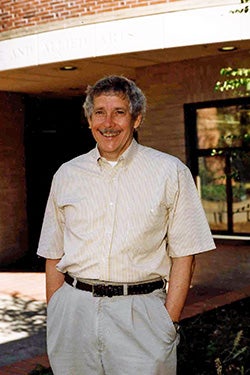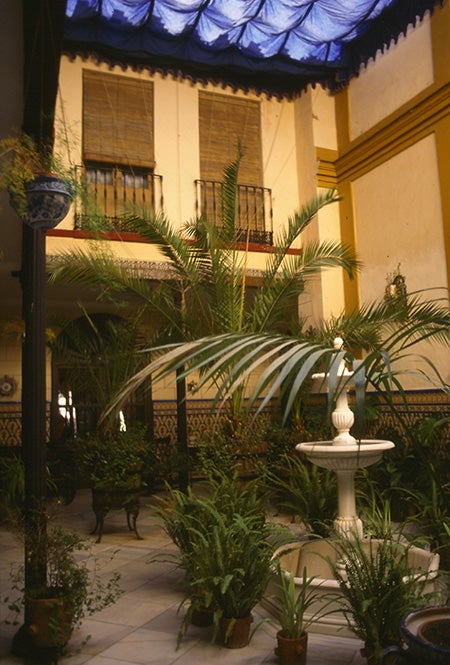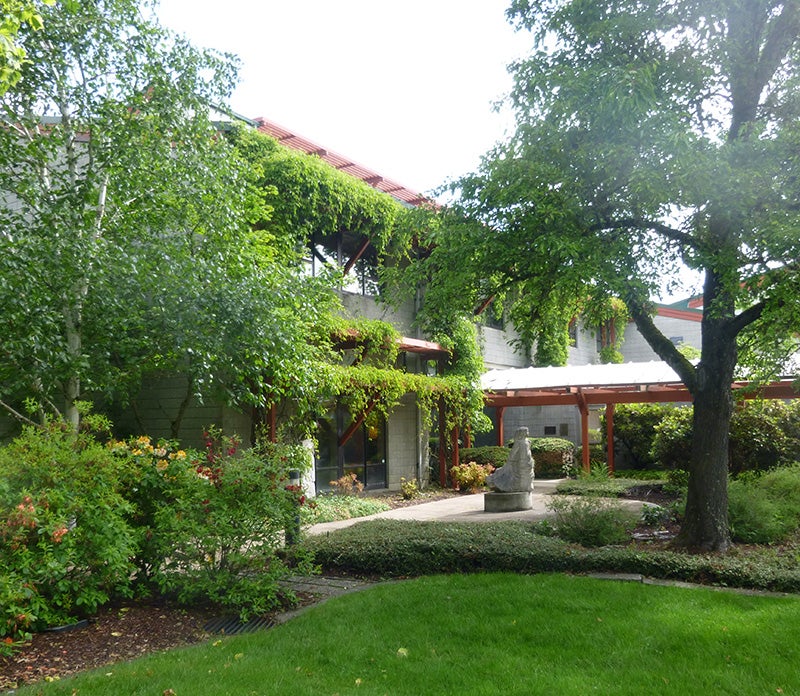Tickets are now available for The John Reynolds Sustainability Symposium, to be held Saturday and Sunday May 16-17 in Eugene. This inaugural event will bring internationally renowned practitioners, researchers, and thought-leaders to campus for lectures, panel discussions, and networking on sustainable design and energy policy.

Above: Emeritus Professor John S. Reynolds
This event is intended to attract, inform, and inspire professionals, faculty members, students, alumni, and friends.
The symposium will be held at the Ford Alumni Center on May 17 beginning at 8 a.m.. A pre-symposium dinner will be held May 16 in the Global Scholars Hall Great Room beginning with a reception at 6 p.m. followed by remarks and dinner from 7-9 p.m.
“Because design, teaching, research and energy policy were important parts of my career at the University of Oregon, we decided to bring together people who were doing leading work in these areas, and who had a close connection to Oregon and/or me,” Reynolds said. “We expect a lively exchange of ideas, and insight to how Oregon came to a position of such influence in the sustainability movement.”
Presenters will include Jean Carroon, FAIA, Goody Clancy; Margie Harris, Energy Trust Of Oregon; Denis Hayes, Bullitt Foundation; Jason McLennan, International Living Future Institute; Ed Mazria, Architecture 2030; Mick Pearce, Architect; and Reynolds.
The symposium also features a panel of “Oregon-Taught Teachers” moderated by UO graduate and UO Associate Professor Virginia Cartwright, “who was my Environmental Control Systems (ECS) student in 1979-80 and my co-teacher of ECS in 1991,” Reynolds said. Other panelists and former Reynolds students include: Professor David P.Y. Lung of the University of Hong Kong, a student in one of Reynolds’ earliest ECS classes; Professor and Associate Dean Susan Ubbelohde, University of California Berkeley, who served as Reynolds’ teaching assistant in ECS in 1980-81; and Professor Alfredo Fernandez Gonzalez, University of Nevada Las Vegas, who was Reynolds’ teaching assistant in ECS in 1997-98.
The ADAPT Student Research Symposium—focusing on topics of economic, ethical, and environmental sustainability—will take place immediately prior to the Reynolds Symposium and includes a reception at 5 p.m. Saturday, May 16, shortly before the Reynolds symposium dinner begins at 6 p.m. The student reception is free and open to the public.
Ticket options for the Reynolds Symposium include the pre-symposium dinner only ($100) with presenters, faculty members, event sponsors, and University or Oregon leadership; space is limited. Registration for the general symposium ($150) covers breakfast, presentations, luncheon, and Sunday evening reception. Tickets are available online or by phone at 541-346-3697. Discounted hotel rooms are available at the Eugene Hilton for symposium guests.
For more than forty-five years Reynolds has been interested in how people use energy in buildings and how buildings shape that energy usage. He has taught both architecture design and environmental control systems at UO since 1967.

Above: An image from Reynolds’ book Courtyards: Aesthetic, Social, and Thermal Delight. Photo courtesy John Reynolds.
Reynolds is coauthor of Mechanical and Electrical Equipment for Buildings (John Wiley & Sons, sixth-eleventh editions), a widely used textbook that he transformed into a reference on sustainability practices. He received a Fulbright grant to Argentina in 1988 where he taught “Arquitectura Bioclimatica” in Spanish. His investigations into courtyard buildings led to a grant from the Graham Foundation for Advanced Studies in the Fine Arts in 1995-96, which resulted in Courtyards: Aesthetic, Social, and Thermal Delight (John Wiley & Sons, 2002).
Reynolds received the American Solar Energy Society’s Passive Pioneer Award in 1997, and was elected a Fellow in 2000. He then served as chair of the ASES board. He was named Distinguished Professor by the Association of Collegiate Schools of Architecture in 1998, the first Oregon faculty member to be so honored. He was named a Fellow of the American Institute of Architects in 2003. The Cascadia Region of the U.S. Green Building Council honored Reynolds as an Honorary Fellow in 2009.
He is currently on the board of the nonprofit Energy Trust of Oregon, based in Portland, where he served as board president for the past five years. Reynolds is the only one of the original board members still serving.
“Sustainable buildings are partners with their site and community and climate,” Reynolds says. “They respond to the variability of sunlight and its heat, of wind’s power to ventilate, of rainfall’s scarcity or excess. They give building occupants the choice and the knowledge of how to adjust their buildings in the face of this climate variability. They are made of materials and techniques that cause minimal environmental strain in their production, transport, and usage. They are designed for energy efficiency and for resilience in the face of a changing climate as well as changing building usage. They beautifully represent architecture as a performing art.”
The event is sponsored by the Department of Architecture and the School of Architecture and Allied Arts with generous donations from EWEB, ILFI (International Living Future Institute), The Van Evera and Janet M. Bailey Fund of the Oregon Community Foundation, Energy Trust of Oregon, and contributors Leddy Maytum Stacy Architects, Opsis Architecture, and Phyllis R. Naylor.
Proceeds from the symposium will help support the John S. Reynolds Architecture Symposium Fund established at the University of Oregon Foundation. The Fund will support symposia that focus on issues, problems, advances, technologies, practices, and other topics that pertain to sustainability in architecture teaching, research, practice, policy, and community activity.
Those unable to attend or who wish to support the fund in honor of Reynolds may use the secure, online giving site available at the University of Oregon Foundation.

Above: Eugene People’s Utility District (EPUD) headquarters, one of six public utility districts in Oregon, was designed by John Reynolds and utilizes passive heating and cooling approaches. Photo courtesy John Reynolds.

Above: Volumes one through eleven of Mechanical and Electrical Equipment for Buildings (MEEB). Reynolds coauthored volumes six through eleven and transformed the MEEB textbook into an important reference for sustainable design. Photo by Omar Hason.
